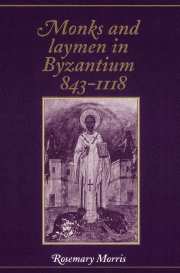Book contents
- Frontmatter
- Contents
- List of maps
- List of tables
- Acknowledgements
- Note on transliteration and citation
- List of abbreviations
- Introduction
- PART I FOUNDERS AND BENEFACTORS
- 1 The resurgence of the monastic life
- 2 Groups, communities and solitaries
- 3 Monastic founders
- 4 Monasticism and society
- 5 Piety, patronage and politics
- PART II PROTECTION AND SURVIVAL
- Appendix: Imperial privileges to monasteries, c. 900–1118
- Bibliography
- Index
3 - Monastic founders
from PART I - FOUNDERS AND BENEFACTORS
Published online by Cambridge University Press: 10 December 2009
- Frontmatter
- Contents
- List of maps
- List of tables
- Acknowledgements
- Note on transliteration and citation
- List of abbreviations
- Introduction
- PART I FOUNDERS AND BENEFACTORS
- 1 The resurgence of the monastic life
- 2 Groups, communities and solitaries
- 3 Monastic founders
- 4 Monasticism and society
- 5 Piety, patronage and politics
- PART II PROTECTION AND SURVIVAL
- Appendix: Imperial privileges to monasteries, c. 900–1118
- Bibliography
- Index
Summary
The variety of monastic styles available to Byzantines of the tenth and eleventh centuries brought with it a serious problem of choice. Although the question of which house to enter, or which to patronise, was often solved by geographical proximity or family loyalty, a very strong influence on recruitment was the personality and outlook of the monastic founders themselves. Knowledge of the precise régime followed in any particular house was perhaps limited, whereas the charisma of individual holy men was both more widespread and more accessible. Dry, technical discussions of the virtues of the koinobia in relation to those of the lavrai could not in themselves attract men and women to follow the monastic life; they sought human examples of monastic virtue and ascetic achievement upon which to model themselves, and those of their own times were often more attractive than those of the past. It is, therefore, of considerable importance to attempt to discover what kind of men (for women were rarely involved) provided this attraction and had such an important influence on the continued growth of monasticism in this period.
There are, of course, many pitfalls in such a study. The main source of information about the lives and careers of most of these monastic founders is hagiography written after their deaths and, more importantly, after the houses associated with them had been founded.
- Type
- Chapter
- Information
- Monks and Laymen in Byzantium, 843–1118 , pp. 64 - 89Publisher: Cambridge University PressPrint publication year: 1995



